Stem Cell Educator Therapy, The Process & The Results
The Process - An Immunological "Re-Set"
Throne’s Stem Cell Educator Therapy is designed to reverse the root causes of autoimmune diseases, such as diabetes and alopecia, by fundamentally “resetting” the immune system through a one-time dialysis-like treatment using CB-SC stem cells.
Stem Cell Educator Therapy is recognized as the leading “Practical Cure Projects” for type 1 diabetes among 590 global technologies (JDCA State of the Cure 2021).
10 years of clinical studies in Spain, China, and United States have demonstrated the clinical safety and efficacy of Stem Cell Educator Therapy in over 200 patients ages 3-70. Throne is on track to commercializing this ready-to-use technology through three FDA phase 2 approvals for the treatment of type 1 diabetes, alopecia areata, and COVID-19.
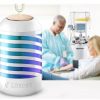
The Stem Cell Educator Treatment Process - Video
Stem Cell Educator Therapy In More Detail
Stem Cell Educator Therapy (i.e. Educator Therapy) is an in vitro process where a patient’s white blood cells are circulated through a Stem Cell Educator device that is coated with human umbilical cord blood-derived multipotent stem cells, CB-SCs. As this circulation occurs, the patient’s white blood cells (MNCs) intercept the CB-SC’s communications, re-educating the cells back to their pre-diseased state. This process then circulates only the ‘educated’ white blood cells back into the patient (the CB-SCs never leave the Stem Cell Educator device). The newly ‘educated’ cells then educate other defective cells in the patient’s body on who to fight and who to protect. This immune reset allows the patient’s immune system to fight for its healing the way it was initially designed. Unlike other stem cell treatments, Educator Therapy does not introduce stem cells or reagents into patients, ensuring 100% immune acceptance and zero risk of rejection.
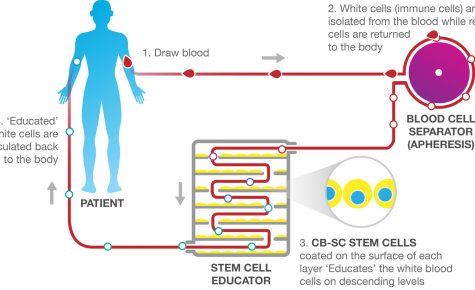
Stem Cell Educator Therapy (i.e. Educator Therapy) is an in vitro process where a patient’s white blood cells are circulated through a Stem Cell Educator device that is coated with human umbilical cord blood-derived multipotent stem cells, CB-SCs. As this circulation occurs, the patient’s white blood cells (MNCs) intercept the CB-SC’s communications, re-educating the cells back to their pre-diseased state. This process then circulates only the ‘educated’ white blood cells back into the patient (the CB-SCs never leave the Stem Cell Educator device). The newly ‘educated’ cells then educate other defective cells in the patient’s body on who to fight and who to protect. This immune reset allows the patient’s immune system to fight for its healing the way it was initially designed. Unlike other stem cell treatments, Educator Therapy does not introduce stem cells or reagents into patients, ensuring 100% immune acceptance and zero risk of rejection.
What about safety and efficacy?
Our published and unpublished data has demonstrated Educator Therapy to be entirely safe and non-invasive. Unlike any other stem cell treatment, Educator Therapy does not introduce stem cells or reagents into patients, ensuring 100% immune acceptance and zero risk of rejection.
Individuals who undergo Educator Therapy experience minimal to zero side effects. Minimal side effects include slight discomfort from the apheresis process (blood draw).
What Sets Educator Therapy Apart?
1. No stem cell injections, transplantations, or blood transfusions occur. Educator Therapy utilizes an in vitro method, ensuring immune acceptance and eliminating risks of rejection. Stem cells are permanently contained in the Educator Device, ensuring no foreign cells enter the patient’s body.
2. CB-SCs. Discovered and patented by Dr. Yong Zhao, Educator Therapy is the only technology in the world licensed to use these powerful multipotent stem cells. They are the only stem cell with the capability to restore autoimmunity and completely eliminate the requirement for stem cell genetic matching because of their low immunogenicity.
3. Zero stem cells come from animals or aborted fetuses. These stem cell treatment methods often result in safety risks, ethical and religious concerns. Educator Therapy is ethically responsible.
Stem Cell Educator Therapy - The Results
The immune dysfunction of type 1 diabetes (T1D) is complicated. There are several different tiers of the immune system (e.g. T cells, Tregs, B cells) contributing to the autoimmune responses. To address these different tiers, a comprehensive immune modulation approach is needed.
Findings from our clinical trials provide powerful evidence that a single treatment of Educator Therapy provides lasting reversal of autoimmunity, allowing the regeneration of islet b cells and improving the metabolic control in individuals with long-standing type 1 diabetes [7]. Additionally, individuals experienced markedly improved C-peptide levels, reduced median glycated hemoglobin A1C values (HbA1C) and decreased daily insulin doses. Notably, a single treatment could improve islet b function that lasts a year.
In an open-label, Phase 1 and Phase 2 study, 15 individuals with T1D received one treatment of Educator Therapy. Their median age was 29 years (range, 15 to 41) and their median diabetic history was 8 years (range, 1 to 21). The results of these studies revealed increased expressions of costimulating molecules (specifically CD28 and ICOS), increased numbers of Tregs and CD4, CD25 and Foxp3, as well as restored Th1/Th2/Th3 cytokine balances.
These trial findings indicate that Educator Therapy with CB-SCs meets the scientific expectation that a successful T1D therapy will have the capability to address different arms of the autoimmune response and restore balance to the immune system through systemic and local modulations. This is a capability that Educator Therapy has clearly demonstrated through our clinical data and animal studies [1, 7, 8, 12].
Currently, we are performing an international multi-center Phase 2 clinical trial to improve the efficacy of Educator Therapy. For more information, please visit ClinicalTrial.gov.
Clinical Case Reports—Type 1 Diabetes
Case 1: A T1D patient (female, 15-year old, 5-year diabetic duration) received one treatment of Educator Therapy, with one-year follow-up. C-peptide response following a 75-g oral glucose tolerance test (OGTT) reveals a significant improvement of b-cell function by Educator Therapy. The dashed red line indicates the lower limit for normal C-peptide levels in Chinese populations. To convert C-peptide value to nmol/L, multiply the ng/ml by 0.331.
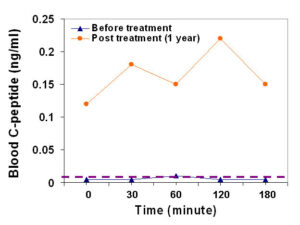
Case 2: C-peptide response following a 75-g OGTT from another severe T1D subject (male, 40-year old, 17-year diabetic duration) received one treatment with Stem Cell Educator therapy, with one-year follow-up. The level of 0.01 ng/ml is the minimum detectable level (sensitivity, the dashed purple line) of C-peptide by radioimmunoassay (RIA). To convert C-peptide value to nmol/L, multiply the ng/ml by 0.331.
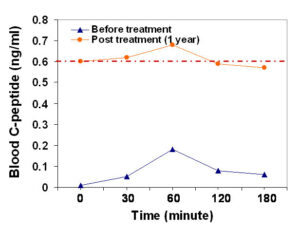
Educator Therapy in Type 2 Diabetes
A successful approach to Type 2 Diabetes (T2D) is one that will have the ability to overcome immune dysfunction, as this will be a key tool in addressing the immune response of insulin resistance in T2D patients. In an open label, Phase 1 and Phase 2 study, patients (N = 36) with long-standing T2D were divided into three groups (Group A, oral medications, N = 18; Group B, oral medications + insulin injections, N = 11; Group C having impaired b-cell function with oral medications + insulin injections, N = 7). All patients received one treatment of Educator Therapy. The results of these studies revealed improved metabolic control and reduced inflammation markers. Notably, homeostasis model assessment (HOMA) of insulin resistance (HOMA-IR) demonstrated that insulin sensitivity was improved post treatment (Figure Left). Islet-beta cell functions in Group C were markedly recovered (Figure Right) and C-peptide levels were restored. Mechanistic studies as well as clinical data from current Phase 1 and Phase 2 studies have revealed that Educator Therapy reverses immune dysfunctions through immune modulation on monocytes, balances Th1/Th2/Th3 cytokine production, and produces lasting improvement in metabolic control for individuals with moderate or severe T2D who receive a single treatment. In addition, Educator Therapy does not have the safety and ethical concerns associated with conventional stem cell-based approaches.
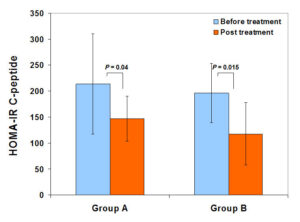
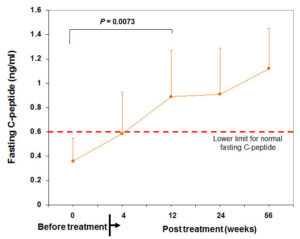
Clinical Case Reports—Type 2 Diabetes
Case 1: Before receiving Educator Therapy, patient A (male, 52 years old, 12 years diabetic duration) had been treated with current medications (e.g., metformin, sulfonylureas, pioglitazone) but was unable to control his blood sugar levels (retaining at ~10 mmol/L), despite his insulin dosage increasing to 70 U/day. He had been hospitalized with a minor stroke (left brain). This patient displayed the typical insulin resistance, as demonstrated by a 75-g OGTT test with normal levels of fasting and stimulated C-peptide. After receiving Educator Therapy, his insulin dosage decreased by 20 U/day one month later. At 6 months post treatment, his insulin dosage had continually decreased to 50%, with occurrence of hypoglycemia if injected a little bit more insulin. Notably, his HbA1C level was reduced from base line 9.4% to 7.1% by month 6 (note: 7% is the ADA-recommending standard for diabetics). His fasting blood sugar levels retained at 6 ~ 7 mmol/L. This data demonstrates that Educator Therapy can markedly improve insulin sensitivity and overcome insulin resistance (the key issue of T2D).
Case 2: A long-standing diabetic patient B (female, 57 years old, 27 years diabetic duration, 32 U insulin/day) displayed an impaired islet beta cell function with the fasting C-peptide level 0.16 ng/ml (note: o.6 ng/ml is the lower limit for normal C-peptide levels in Chinese populations.). After receiving Educator Therapy for 3 months, her fasting C-peptide level markedly increased to 0.54 ng/ml; correspondingly and her daily insulin dosage decreased by 50%. Her HbA1C level was reduced from base line 7.3 % to 6.4% by month 3. This data indicates that Educator Therapy can restore the islet beta cell function and improve the metabolic control.
Our Scientific Publications
Click Here To Review Our Many Peer-Reviewed Scientific Publications That Show The Science And The Results That Support Our Stem Cell Educator Therapy For Diabetes And Other Autoimmune Disorders
Frequently Asked Questions
Treatment
Educator Therapy primarily treats Type 1 Diabetes and Alopecia Areata. Additional autoimmune diseases have been tested with Educator Therapy: Type 2 Diabetes, Alopecia Totalis, Alopecia Universalis, Lupus, Psoriasis, Graves’ Disease, Hashimoto’s Disease, Scleroderma, Fibrosis, and Sjogren’s Syndrome. Further research is being developed to use Educator Therapy to treat additional incurable diseases.
Dr. Yong Zhao discovered and patented the human umbilical-cord blood stem cell (CB-SC) in 2005. He later found that CB-SCs are also found in human adult blood, known as peripheral blood insulin-producing stem cells (PB-SCs or PB-IPC). CB-SCs are more powerful than any other multipotent stem cells. They completely eliminate the requirement for stem cell matching because they have very low immunogenicity. Stem Cell Educator Therapy is the only technology in the world licensed to use these stem cells.
Depending on the facility, the Stem Cell Educator Therapy may be administered in one of two ways: closed-looped treatment or open-looped treatment. Both treatments provide a patient with their own blood separator and Educator device.
For closed-looped treatment, the patient’s blood is cycled from one arm to a blood separator (apheresis machine) where their white bloods are separated (the red blood cells are immediately returned to the body). Next, their white blood cells are passed through the Stem Cell Educator device where they are treated (re-educated) and then directly returned to the patient’s body through the other arm. This continuous loop lasts for 8 to 9 hours.
For open-looped treatment, the process is split between two days. On day one, the patient’s blood is drawn and 200 milliliters of white blood cells are separated over the course of 4 hours (the red blood cells are immediately returned to the body). Overnight, the white blood cells are incubated in the Stem Cell Educator device for 17 hours. On day two, the patient returns to the facility and the treated white blood cells are infused back into their body.
Zero stem cell injections, transplantations, or blood transfusions occur in Educator Therapy. Instead, Educator Therapy utilizes an in vitro method where CB-SCs are permanently contained in the patient’s personal Educator Device. This ensures immune acceptance and eliminates any risks of rejection, as the only cells entering the patient’s body are their own white blood cells that have been treated by the CB-SCs.
Yes, zero stem cells from animals or aborted fetuses are used in Educator Therapy, as these treatment methods result in safety risks, ethical and religious concerns.
No, Educator Therapy does not require genetic matching. CB-SCs, the multipotent stem cells used in Educator Therapy, have very low immunogenicity and therefore eliminate the requirement for genetic stem cell matching.
Throne Biotechnologies partners with domestic (umbilical) cord blood banks. All cord blood provided to Throne Biotechnologies Inc. for Educator Therapy is thoroughly screened.
No, Educator Therapy does not use any stored cord blood. The freezing process that occurs when cord blood is stored results in a 20% loss of stem cells. For this reason, Educator Therapy only uses fresh umbilical cord blood obtained from domestic cord blood banks. There is no benefit to using personal stored cord blood because CB-SCs eliminate the need for genetic matching in Educator Therapy’s in vitro process.
Our clinical trials provide powerful evidence that a single treatment with Educator Therapy may provide lasting reversal of autoimmunity. Type 1 and Type 2 Diabetes patients have experienced both significant reduction and complete elimination of insulin injections. Alopecia patients have experienced significant hair regrowth. These are just a few examples of the benefits of Educator Therapy.
Autoimmunity is complex because every individual’s body responds differently. Patients must recognize their role in maintaining a healthy lifestyle post-treatment to foster their renewed autoimmunity.
Educator Therapy can provide lasting reversal autoimmunity through one treatment. Most patients receive one to two treatments.
One treatment of Educator Therapy will take roughly 8 to 9 hours, often split between two days.
After treatment, patients are encouraged to monitor their normative response (i.e. clinical outcomes) through their family doctors and/or endocrinologist. As they monitor their normative responses post-treatment, they can adjust any typical dosages based on their family doctor’s recommendations.
SCIENTIFIC EVIDENCE AND OVERSIGHT
Dr. Zhao has successfully published multiple peer-reviewed clinical journals detailing the safety and effectiveness of Stem Cell Educator Therapy. Click here to be redirected to Throne’s Journal Publications page.
Clinical trials have proven Educator Therapy to be safe, non-invasive and effective with one treatment producing lasting improvement in metabolic control and immune modulation.
Throne Biotechnologies has received two approvals for the second of three clinical trial phases from the FDA. The third phase of clinical trials is anticipated to conclude within the next three years, at which point Educator Therapy will be FDA approved for commercialization. Please click here to be redirected to the FDA’s website where you can read further about the development and approval process.
SAFETY AND EFFICACY
Yes, Educator Therapy is safe and non-invasive. Unlike any other stem cell treatment, Educator Therapy does not introduce stem cells or reagents into patients, ensuring 100% immune acceptance and zero risk of rejection.
As Educator Therapy is a non-invasive treatment with zero stem cells or reagents introduced into the patient, there are no risks or safety concerns associated with it.
Individuals who undergo Educator Therapy experience minimal to zero side effects. Minimal side effects include slight discomfort from the apheresis process (blood draw).